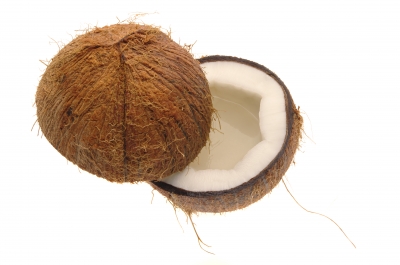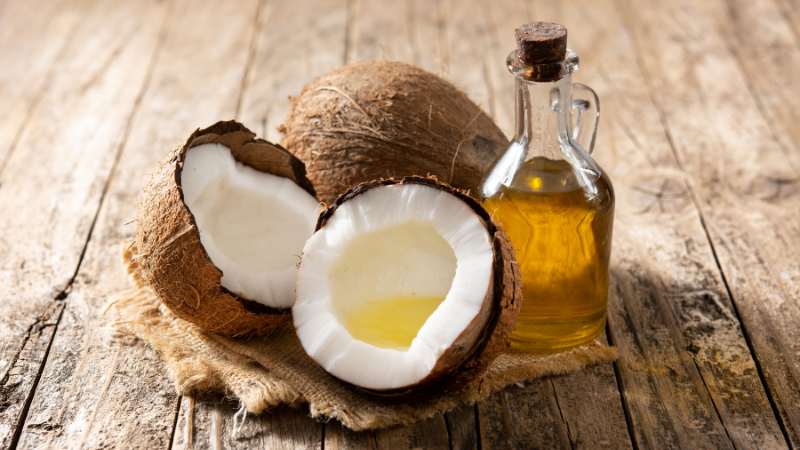Coconut oil is a medium-chain saturated fat. Unlike long-chain saturated fats, this is a very healthy type of fat, for both eating and applying topically. It is almost always free from pesticides, chemicals or any other contaminants and has been used for decades in soaps, shampoos, creams, and other body-care products. Coconut oil is very safe, protective, and anti-allergenic for babies, tender skin, as well (as with all products used with babies. Consult your trusted medical professional with any questions or concerns).
As with almost all natural products, the less processing the better. Terminology for natural products can often be manipulated and misleading, so the best way to determine the quality of the oil is your own senses. One should be looking for virgin coconut oil that is pure white with a smooth, creamy texture when solid (up to about 760F), and crystal clear when liquid. It should have a mild, light coconut taste and aroma. If it tastes bitter or is otherwise unpleasant, it is low quality or contaminated, and should be avoided.
How To Use Coconut Oil
The aromatics of plants also have powerful antioxidant effects and antibacterial benefits for the skin. Many times, when combined with a high quality, medium-chain saturated fat, such as coconut oil, the healing effects of essential oils will be enhanced synergistically. The combined oils will slow moisture evaporation, allowing more time for the oils to penetrate the skin, while maintaining the lipid barrier of the skin.
Note: Those who experience a warming, reddening, or other “negative” reaction to therapeutic grade essential oils are typically in an acidic physical state. Psoriasis, eczema, dermatitis, dry skin, allergies, and similar problems usually indicate an excessive acidic pH in the body. The more acid in the blood and skin, the less helpful effects the oils will have. An alkaline balance must be maintained in the blood and skin for the oils to work best. Lemongrass oil may be very helpful in balancing the pH of the skin.
Here are some uses of coconut oil:
Sun and Age-spot Protection
As we age, brown age spots, sometimes called “liver spots”, frequently appear on our arms, and other areas of our skin. This pigment is called lipfuscin, caused primarily by the oxidation of polyunsaturated fats and protein by free-radical activity in the skin. While they cause no physical discomfort, this same pigmentation and damage is also happening to internal tissues as well – intestines, lungs, kidneys, brain, and so on. The amount of this free-radical damage that shows on your skin is a marker of the free-radical damage, or aging, your organs have suffered, also, which may ultimately interfere with the healthy function of the organs. This damage can be prevented or reduced by using the right kind of oils in your diet and on your skin, and coconut oil is the BEST natural skin lotion available.
Coconut oil contains many natural anti-oxidants and other compounds that help protect the skin from sunburn and free-radical damage. Just look at the smooth, healthy skin of our sisters living in the tropics, who have used coconut oil as their daily body lotion for centuries! Applying coconut oil to sunburned skin has also been shown to significantly diminish the discomfort and speed healing. It has even been seen to restore damaged or diseased skin.
Many essential oils may heal damaged skin, and just a few drops added to the coconut oil will enhance the benefits of each. Some essential oils that are especially effective are rose, sandalwood (referred to as “aloes” in the Bible), spikenard (“nard” in the Bible), myrrh, frankincense, geranium, lavender, and vetiver.
Wrinkle Prevention
Coconut oil is the perfect facial moisturizer, as it provides a protective shield against drying out, while actually promoting new skin cell regeneration. Some of the compounds in coconut oil help regenerate collagen to help prevent wrinkles and strengthen the skin’s underlying tissues. It is an excellent yet gentle exfoliant encouraging the shedding of excess layers of dead skin cells, to reveal a smooth youthful and healthy complexion. And don’t worry about appearing greasy, coconut oil is quickly absorbed, and does not sit on the surface of the skin! Those with dry skin may find they need to reapply the coconut oil more frequently than they are accustomed to, but over time they will observe the coconut oil will gradually soften the skin, remove the dead layers, and encourage the growth of new, healthier tissue. To enhance the rejuvenating effects of coconut oil, consider adding a few drops of lavender, spikenard, myrrh, frankincense, sandalwood, vetiver, cypress, rose, patchouli, or neroli.
Infection Protection
Have you found the use of alcohol-based hand cleansers to be less than desirable? You are right! Besides dehydrating your skin, these preparations kill the lipophilic bacteria that are vital to our health! Through metabolic processes, these “good” bacteria allow our natural skin oil to kill harmful bacteria, viruses, and fungi, creating a very effective layer of protection. Whenever we wash with soap (especially anti-bacterial soaps) and water, or use these alcohol based cleansers, we strip this natural protection, becoming MORE vulnerable to certain infections. The medium-chain triglycerides in coconut oil collaborate with your own skin’s sebum to quickly re-establish your body’s natural chemical barrier to infection.
Some of the most effective anti-infectious essential oils to consider adding to your coconut oil include melaleuca alternifolia (aka, “tea tree oil”), melaleuca quinquenervia (aka, “nialouli”), lemongrass, oregano, lavender, and patchouli.
Acne and Odor Protection
While this oil helps prevent wrinkles, it also helps to prevent and heal acne blemishes as well, with its antibacterial action and pH balancing effects! Due to coconut oil’s anti-viral, anti-fungal, anti-parasitical, and anti-bacterial properties, it can also be used as a very effective natural deodorant. When coconut oil is consumed, and to some extent, applied topically, the medium-chain fatty acids are broken down into free fatty acids, which become powerful antimicrobials that can kill disease-, pimple-, and odor-causing bacteria, viruses, and fungi.
Clogged pores frequently accompany acne. Orange, geranium, lemon and cypress essential oils, applied undiluted have been shown to dissolve the solidified sebum and other contaminates. Note: Do not apply citrus oils for several hours before extended sun exposure. Melaleuca A. (“tea tree oil”) dorado azul, and lemongrass can also help clear acne and balance oily skin conditions. Several essential oils added to coconut oil will create a pleasant and effective anti-deodorant, including lemon, lavender, rosemary, rosewood, geranium, frankincense, and many others.
To keep your skin smooth and ageless; to protect your skin from acne and wrinkles; to prevent skin infections and sun damage, unpleasant odor and organ damage, consider pleasant, light, nutritious coconut oil and your favorite essential oil.
References regarding aluminum toxicity:
1) http://www.ncbi.nlm.nih.gov/pubmed/8772801
2) http://www.ncbi.nlm.nih.gov/pmc/articles/PMC1567377/
3) http://www.ncbi.nlm.nih.gov/pubmed/2197055
Reference regarding benefits of coconut oil:
1) Bergsson, G, Arnfinnsson S., Karlsson SM, Steingrimsson O., Thormar H. 1998. In vitro inactivation of Chlamydia trachomatis by fatty acids and monoglycerides. Antimicrobial Agents and Chemotherapy 42.
2) Kabara, JJ 1978. The pharmacological effect of lipids. Champaign, IL ; The American Oil chemists Society
3) Sadeghi, S, Wallace FA, Calder PC, 1999 Dietary lipids modify the cytokine response to bacterial lipopolysaccharide in mice. Immuniology 96(3).



